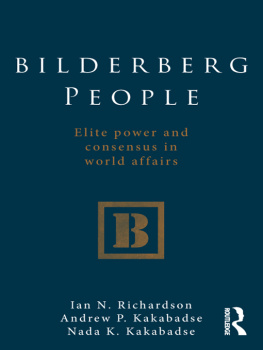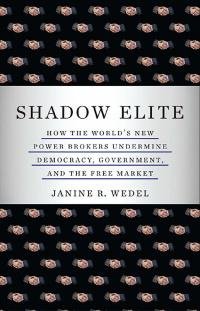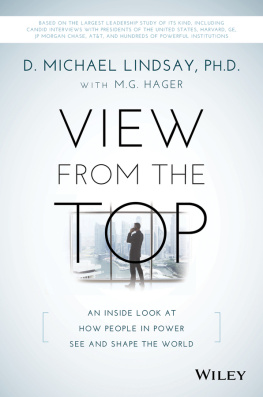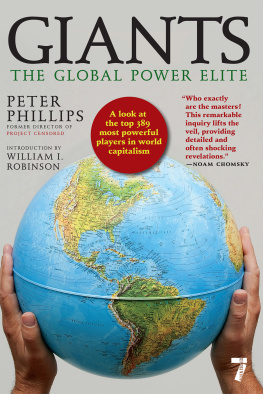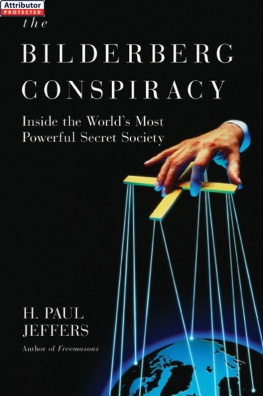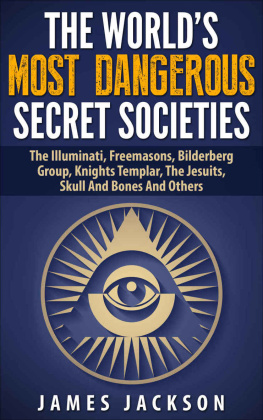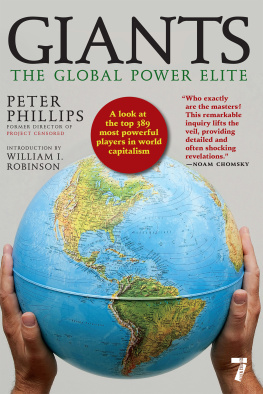Acknowledgments
As this book owes much to the PhD research that preceded it, wed like to acknowledge the generous support of people and organizations who have contributed at all stages of its transition from improbable research proposal to published form.
Were grateful for the support of the Economic and Social Research Council, which enabled the research in the first instance. Wed also like to thank our friends at Cranfield University School of Management for their valuable input at various stages in the development of the research most especially the feedback of Paul Baines, Joe Nellis, and Colin Pilbeam. Thanks must also go to Madeleine Fleure for her fantastic help with the manuscript, Sheena Darby for her support throughout, and the ever-helpful team at the School of Management library.
Wed also like to thank the many people whove helped with guidance, information, and introductions. For obvious reasons we cant detail all of them but, to those we can, our thanks go to Lord Sawyer, whose assistance was invaluable; Orhan Yavuz, for his introductions, support and tremendous hospitality; Bill Hayton, for his ongoing interest and insightful interview material; Kees van der Pijl, for his early, and accurate, reflections on how these things work; and Tatjana Kralji and Cesar Mascaraque for their very kind help with introductions.
Our thanks also go to the members and attendees of Bilderberg who contributed so frankly to the research the meetings were invariably thought-provoking and good humoured.
Finally, special thanks to Valerie Watt for her unfaltering support and commitment to this project.
Authors biographies
Ian N. Richardson is an Assistant Professor at Stockholm University Business School and a Visiting Fellow at Cranfield University School of Management, UK. His research interests include global governance, transnational policy networks, business and political elites, transnational corporations, multi-stakeholder collaboration, power and consensus in organizations, and political marketing. As a former business leader and entrepreneur in the European digital information sector, he has an ongoing interest in innovation and regulation related to the internet and continues to advise organizations within the sector.
Andrew P. Kakabadse is Professor of International Management Development, Doughty Centre, Cranfield Universitys School of Management, UK. Recognized as a world authority on leadership and governance, Andrew has held and also holds visiting appointments at the Copenhagen Business School, Denmark; Universit Panthon Assas, Paris, France; Center for Creative Leadership and Thunderbird, the Garvin School of International Management, United States; University of Ulster; The Windsor Leadership Trust, UK; Institute of Management Economics and Strategic Research, Kazakhstan; and Macquarie Graduate School of Management, Australia. He has consulted and lectured in every region of the world. His bestselling books include The Politics of Management, Working in Organizations, The Wealth Creators, Leading the Board, Rice Wine with the Minister , and Leading Smart Transformation: A Roadmap to World Class Government .
Nada K. Kakabadse is Professor in Management and Business Research at the University of Northampton, Business School and Visiting Professor at US, Australian, French, Kazakhstani and Chinese universities. She has co-authored seventeen books (with Andrew Kakabadse) and has published over 140 scholarly articles. Her current areas of interest focus on leadership, strategy, boardroom effectiveness, governance, corporate social responsibility and ethics, and the impact of ICT on individuals and societies. Nada is co-editor of the Journal of Management Development and the journal Corporate Governance .
INTRODUCTION
Iran . Since its revolution in 1979, few countries have been such vociferous critics of western democracy and political consensus. And, with its uranium enrichment program causing undisguised consternation in international diplomatic circles, the western political elite has attempted to forge an international consensus on Irans intentions and how best to deal with them. In January 2010, US Secretary of State Hillary Clinton stated we believe that there is a growing understanding in the international community that Iran should face consequences for its defiance of international obligations and cited the cooperation and support of the Russian and Chinese governments. The implication of her words was clear: an international consensus was emerging and, as it did so, would provide a backdrop to the actions that would surely follow. International consensus has thus become a euphemism for legitimacy as a basis for action in world affairs. But such consensus doesnt just emerge accidentally, it is determined. The power to act in world affairs is driven by the power to influence prevailing consensus.
This is not a book of conspiracies. It is a book about efforts to organize the world at the beginning of the twenty-first century. It concerns the activities of elite networks and, most importantly, their role in forming and disseminating a particular brand of consensus. It argues that to understand the real significance of elites in world affairs today, we need to look beyond crude ideas of power. Instead, we have to come to terms with the more subtle influence of common sense and dominant logic in our societies. After all, nowhere is power more compelling than in our collective imagination.
We live in a time of great uncertainty in world politics. The extent of our problems as a global society easily outstrips the capacity of our governance systems to deal with them. And, despite the successful crafting and relentless advance of economic globalization in recent decades, a lack of collective political will has failed to deliver similarly enthusiastic momentum to global social and political frameworks. This apparent prioritization of the market, ahead of social and political considerations, has led to a significant civil backlash and growing awareness of the obstacles that existing economic arrangements present to the resolution of global problems. Certainly, the faith that many have shown in policies of economic liberalization, designed to facilitate globalization, as a solution to problems of poverty and inequality has been called into question by a growing body of evidence that suggests quite the opposite. And, crucially, globalization and open competition between national economies are affecting the behavior of individual states in ways that make immediate political solutions to global problems seem fairly unlikely. Take, for instance, the cynical horse-trading of developed nations and trade blocs, at the obvious expense of developing countries, in the ill-fated Doha trade talks; the ongoing failure of developed nations to deliver on their promises of Official Development Assistance towards accomplishment of the United Nations Millennium Development Goals; and the dismal spectacle of the Copenhagen Climate Summit in 2009 touted as the final chance for developed and developing nations to come to a binding agreement on carbon emissions and global warming failing to reach any kind of meaningful accord.
In essence, the demand for international cooperation has never been greater, yet the forces capable of delivering it have never seemed more incapable of doing so. Even if we were to assume that our world leaders and the constituencies they represent were willing to cooperate for the common good, which is highly debatable, they are stymied by a complex mire of contradictory and irreconcilable policy demands. These demands exist at all levels of the policy process and are set against a backdrop of pervasive, and largely unspoken, forms of consensus. To fundamentally alter the trajectory of our policy responses, first we have to challenge the nature of this consensus. And what the policy lessons of the past fifty years have taught us, if nothing else, is that established policy structures, processes, and ways of thinking are incredibly difficult to shake even when the case for change seems overwhelming.

